Solar Installers Vinings
Best Solar Panel Installer in Vinings
Receive 3 FREE Solar Energy Companies quotes for your project today! Compare profiles, reviews, accreditations, portfolio, etc... and choose the best service.

Solairgen Inc
4.48 reviewsPO Box 1109, Dahlonega, 30533, USSolairgen offers a comprehensive range of solar installation training courses, from entry-level to advanced, designed to equip students with the skills to thrive in the solar energy field. Their goal is to provide affordable and accredited training, enabling individuals to start a career in solar installation. The courses cover basic to advanced concepts, including solar panel installation, maintenance, and battery systems installation. Solairgen also prepares students for national certifications, such as the NABCEP PV Associate Credential certification exam.
- Services
- Why Us?
- Accreditations
- Our Team
- Testimonials
- Gallery
Get Quote
Creative Solar USA
4.482 reviewsKennesaw, GA, All mail sent here, P.O. Box 1077, 30156, USCreative Solar USA is a Georgia-based, turn-key installer of innovative solar panel systems for residential homes and commercial buildings. Our NABCEP Certified Installers ensure our clients receive the highest quality solar energy systems in the industry and remain committed to clients long after the installation is complete. We don't just build PV systems for our clients – we build relationships.
- Services
- Why Us?
- Accreditations
- Our Team
- Testimonials
- Gallery
Get Quote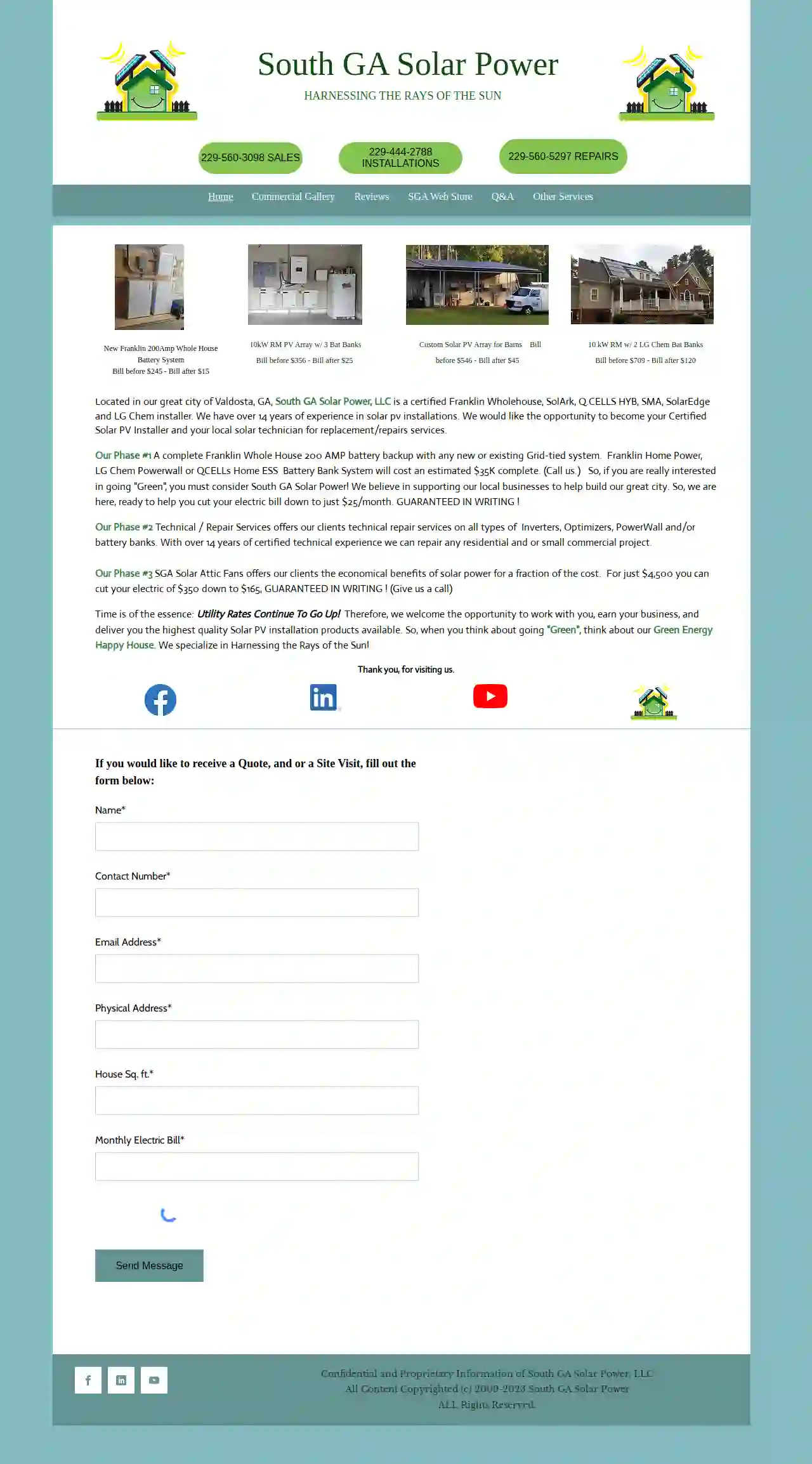
South GA Solar Power
55 reviews123 Main St, Valdosta, 31601, USSouth GA Solar Power, LLC is a certified solar installer located in Valdosta, GA. They specialize in harnessing the rays of the sun to provide green energy solutions to their clients. With over 14 years of experience in solar PV installations, they offer a range of services including technical repair services, solar attic fans, and battery backup systems. Their mission is to help clients reduce their utility bills and support local businesses.
- Services
- Why Us?
- Accreditations
- Our Team
- Testimonials
- Gallery
Get Quote
Georgia Solar Pros
4.933 reviews1775 Pine Park Rd, Cairo, 39828, USGeorgia Solar Pros is a locally owned and operated solar company based in Cairo, near Thomasville, GA. We bring nearly 20 years of construction, roofing, and electrical contracting experience to members of our community looking to go solar. We work with residential and commercial clients and pride ourselves on delivering the highest quality, affordable solar solutions.
- Services
- Why Us?
- Our Team
- Gallery
Get Quote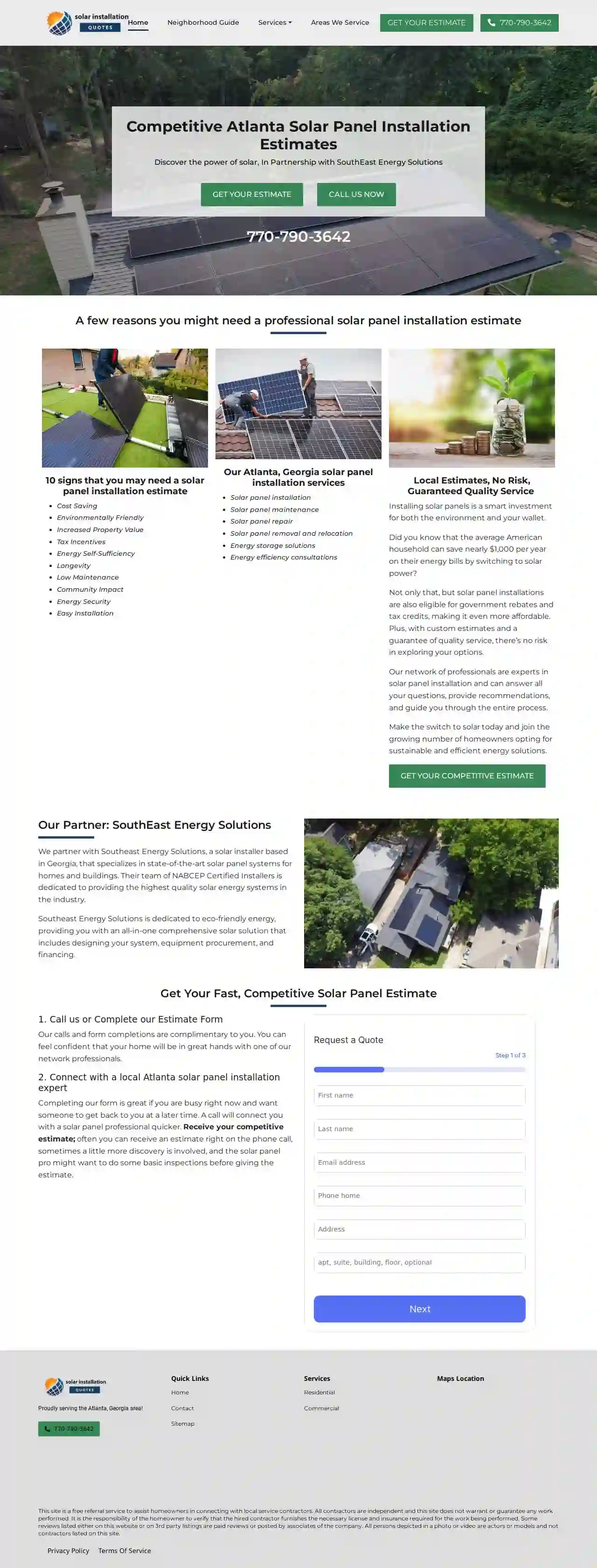
Big Peach Solar Systems
4.948 reviews123 Peachtree St, Suite 100, Atlanta, 30301, USBig Peach Solar Systems is a local business that specializes in solar system design and consultation services in Atlanta. They offer competitive solar panel installation estimates and partner with SouthEast Energy Solutions, a solar installer based in Georgia. Their team of NABCEP Certified Installers is dedicated to providing the highest quality solar energy systems in the industry.
- Services
- Why Us?
- Accreditations
- Our Team
- Testimonials
- Gallery
Get Quote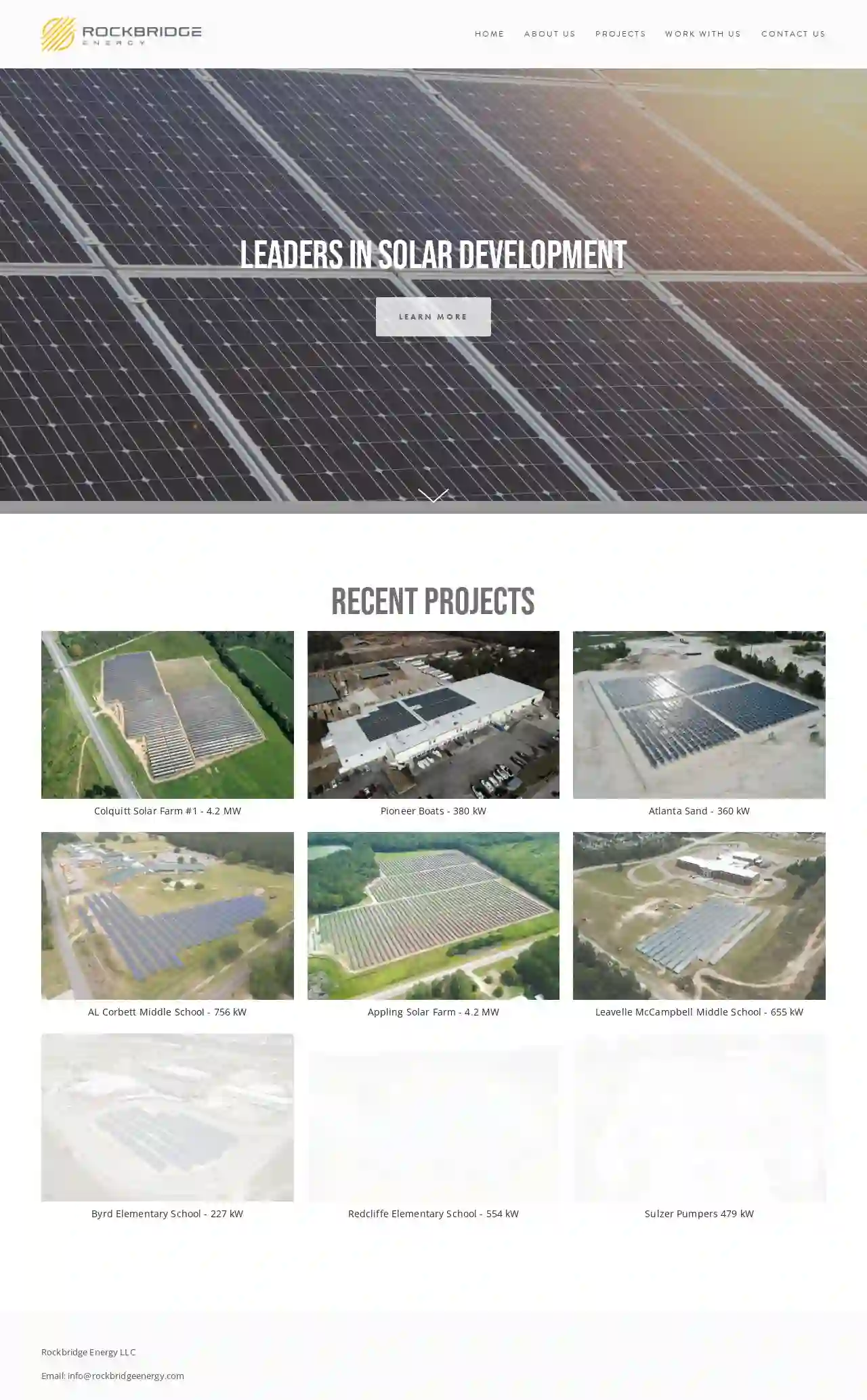
RockBridge Energy LLC
52 reviewsAtlanta, USRockBridge Energy is a leading solar development company that specializes in providing clean energy solutions to commercial and industrial clients. With a strong focus on sustainability and renewable energy, RockBridge Energy has successfully developed numerous solar projects across the country, including solar farms and rooftop installations for businesses and institutions. Their team of experienced professionals works closely with clients to understand their energy needs and develop customized solar solutions that meet their requirements. RockBridge Energy is committed to helping businesses reduce their carbon footprint and save on energy costs through solar energy.
- Services
- Why Us?
- Gallery
Get Quote
Hannah Solar
3.130 reviewsBuilding 2400 Suite 110, Atlanta, GA, 3800 Camp Creek Parkway, 30331, USHannah Solar is a full service solar integrator dedicated to providing the very best in engineering, products, installation and operations & maintenance. We serve the Southeast and National Clients with headquarters in Atlanta, Georgia.
- Services
- Why Us?
- Accreditations
- Our Team
- Testimonials
- Gallery
Get Quote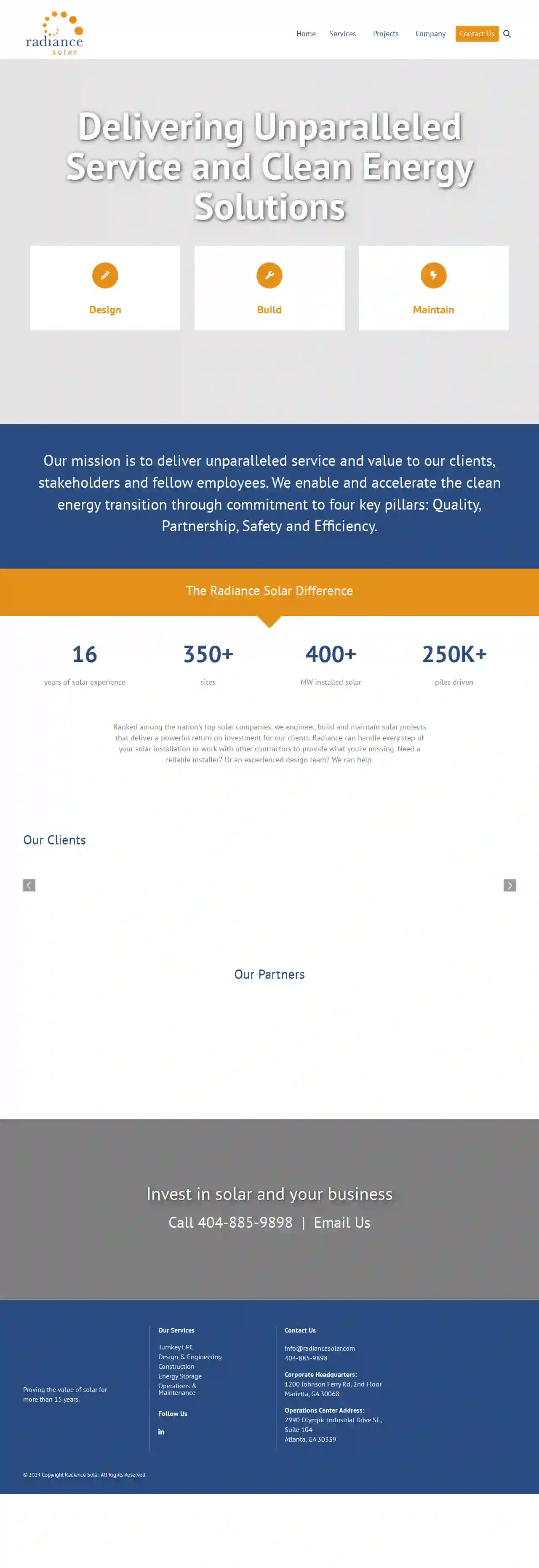
Radiance Solar
4.19 reviews1200 Johnson Ferry Rd, 2nd Floor, Marietta, 30068, USRadiance Solar is a leading solar company with over 16 years of experience in the solar industry. They offer a range of services including turnkey EPC, design and engineering, construction, energy storage, and operations and maintenance. Their mission is to deliver unparalleled service and value to their clients, stakeholders, and fellow employees, enabling and accelerating the clean energy transition through commitment to four key pillars: Quality, Partnership, Safety, and Efficiency.
- Services
- Why Us?
- Accreditations
- Our Team
- Testimonials
- Gallery
Get Quote
Simply Energy
52 reviewsSuite 100, 123 Solar Way, Elk Grove Village, 60007, USSimply Energy is a solar energy company that aims to provide clean, renewable, and earth-friendly solar energy solutions to businesses and homeowners. They offer a range of services including residential and commercial solar installations, off-grid consulting, and EPC (Engineering, Procurement, and Construction) services. Their mission is to help individuals and businesses reduce their living costs, own their power, and contribute to a cleaner environment.
- Services
- Why Us?
- Accreditations
- Our Team
- Testimonials
- Gallery
Get Quote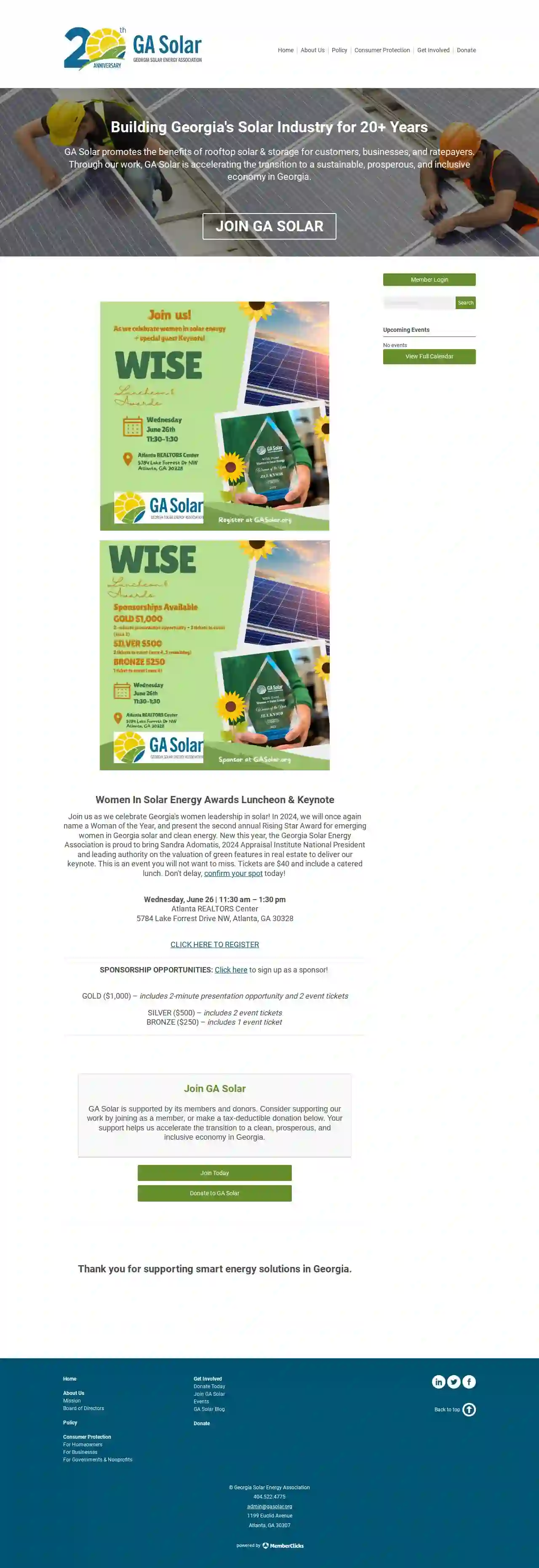
Georgia Solar Energy Association
1199 Euclid Avenue, Atlanta, GA 30307, 30307, USBuilding Georgia's Solar Industry for 20+ Years. GA Solar promotes the benefits of rooftop solar & storage for customers, businesses, and ratepayers. Through our work, GA Solar is accelerating the transition to a sustainable, prosperous, and inclusive economy in Georgia.
- Services
- Why Us?
- Accreditations
- Our Team
- Testimonials
- Gallery
Get Quote
Over 4,210+ Solar Contractors on our platform
Our solar pros operate in Vinings and surroundings!
SolarCompaniesHub has curated and vetted Top Solar Installers in Vinings. Find the most trustworthy business today.
Frequently Asked Questions About Solar Installers
- Contact SolarCompaniesHub: We make it simple to connect with reputable Solar Installers in your area.
- Get Free Quotes: Request free quotes from multiple installers to compare prices, systems, and warranties.
- Schedule a Site Assessment: A qualified installer will visit your property to assess your roof, energy needs, and discuss your goals.
- Review Your Proposal and Contract: Carefully review the proposed system, financing options, and warranties before signing a contract.
- Installation and Activation: Once the contract is signed, the installer will obtain necessary permits, schedule the installation, and activate your solar system.
- Adequate Sunlight: Unobstructed sunlight for a significant portion of the day.
- Sufficient Space: Enough space to accommodate the desired number of panels.
- Structural Integrity: A strong roof structure capable of supporting the weight of the panels.
- Appropriate Orientation and Tilt: Ideally, the roof should face south (in the Northern Hemisphere) or north (in the Southern Hemisphere) with a tilt angle close to the latitude of your location. However, other orientations and tilts can still be effective.
How do I get started with solar panel installation?
What is net metering, and how does it work?
How do I know if my roof is suitable for solar panels?
Do I need planning permission to install solar panels in USA?
How do I get started with solar panel installation?
- Contact SolarCompaniesHub: We make it simple to connect with reputable Solar Installers in your area.
- Get Free Quotes: Request free quotes from multiple installers to compare prices, systems, and warranties.
- Schedule a Site Assessment: A qualified installer will visit your property to assess your roof, energy needs, and discuss your goals.
- Review Your Proposal and Contract: Carefully review the proposed system, financing options, and warranties before signing a contract.
- Installation and Activation: Once the contract is signed, the installer will obtain necessary permits, schedule the installation, and activate your solar system.
What is net metering, and how does it work?
How do I know if my roof is suitable for solar panels?
- Adequate Sunlight: Unobstructed sunlight for a significant portion of the day.
- Sufficient Space: Enough space to accommodate the desired number of panels.
- Structural Integrity: A strong roof structure capable of supporting the weight of the panels.
- Appropriate Orientation and Tilt: Ideally, the roof should face south (in the Northern Hemisphere) or north (in the Southern Hemisphere) with a tilt angle close to the latitude of your location. However, other orientations and tilts can still be effective.